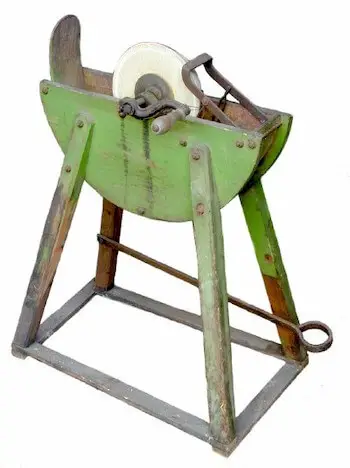To have your interest in something, especially food, stimulated.
Whet your appetite
What's the meaning of the phrase 'Whet your appetite'?
What's the origin of the phrase 'Whet your appetite'?
This phrase is often confused with ‘wet your whistle’. Uncertainty about the spelling of the first word, either as whet or wet, leads to both phrases being wrongly spelled too. In fact there’s no connection between the two terms, which are properly spelled as ‘whet your appetite’ and ‘wet your whistle’. The allusion in the former is to the sharpening of tools on a whetstone (grindstone) and to whet means just to sharpen. So, ‘whetting our appetite’ is ‘sharpening our appetite’.
‘Wet your whistle’ pre-dates ‘whet your appetite’ by some centuries, and was first recorded in the 1386 Towneley Mysteries:
“Had She oones Wett Hyr Whystyll She couth Syng full clere Hyr pater noster.”
Whistle here means throat or voice and the phrase just means ‘take a drink’.
You may see it put about that ‘wet your whistle’ derives from the practice of using a whistle in the taverns of Olde Englande to summon the landlord with more drinks. This is complete tosh. The Internet makes it easy to circulate information; unfortunately it isn’t discriminating and stories like that tend to gain a foothold quite quickly. That form of digitally enhanced folk etymology is called netymology. As French wine growers used to say when complaining of inferior wines that were labelled as the prestigious Appelation Controllé – “the paper never refuses the ink”. If you would like to dispel some popular fallacies you could try life in the 1500s or the Nonsense Nine.
Back to whet/wet your appetite/whistle. The spelling as ‘wet your appetite’ is quite understandable. Whet is no longer a common word, whereas its homonym ‘wet’ obviously is. Also, when tools are ground on whetstones they need to be lubricated with water or oil to prevent overheating. Whetstones were normally constructed with a water bath or some form of drip on to the stone. The assumption that ‘whet’ and ‘wet’ are the same word is thus encouraged. Added to that is the 18th century habit of serving liqueurs as hors d’oeuvre – in that case literally wetting the appetite (they also served turnips as appetizers – thankfully we have moved on).
Although not as old as ‘wet your whistle’, ‘whet your appetite’ has been in the language for some time. It is first alluded to in Thomas Shadwell’s The Squire of Alsatia, 1688:
“Let’s whett; bring some Wine. Come on; I love a Whett.”
A more explicit use is in Thomas Dekker’s If it be not good, the diuel is in it, 1612:
“[He] seekes new wayes to whet dull appetite.”
By the early 19th century the phrase had begun to be used figuratively to refer to sharpening the appetite for things other than food, as here in a report from The Times, May 1801:
“It [defending Portugal] would only whet the appetite of Bonaparte and increafe ftill more the dangers of invafion.”
The history of “Whet your appetite” in printed materials
Trend of whet your appetite in printed material over time
Related phrases and meanings
Browse more Phrases
About the Author

Phrases & Meanings
A-Z
A B C D E F G H I J K L M N O P Q R S T UV W XYZ
Categories
American Animals Australian Bible Body Colour Conflict Death Devil Dogs Emotions Euphemism Family Fashion Food French Horses ‘Jack’ Luck Money Military Music Names Nature Nautical Numbers Politics Religion Shakespeare Stupidity Entertainment Weather Women Work
How did we do?
Have you spotted something that needs updated on this page? We review all feedback we receive to ensure that we provide the most accurate and up to date information on phrases.
